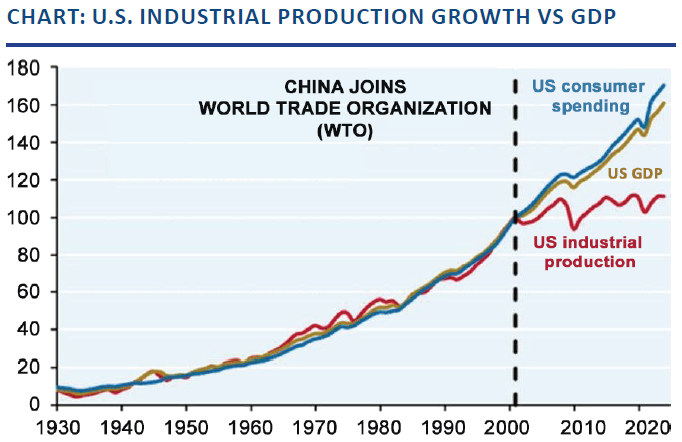
Founders Perspective
Founders Perspective | Policies to Challenge China’s Global Ambitions
John Merrill, April 2, 2025
China was seen as a partner through most of the 1980s, 1990s, and early 2000s. They specialized in making everyday goods cheaper, which benefited most of our consumers and kept inflation (and interest rates) down around the world.
Yet not everyone benefited. After China was allowed to join the WTO in 2001, our manufacturing base slowed remarkably relative to economic growth. See Chart. Many working class Americans counted on manufacturing jobs for good pay and benefits.
Source: BEA, Federal Reserve, JPMAM, 2024
For a generation, both economists and politicians believed this was for the “greater good” as cheaper prices benefitted all Americans. Displaced workers were to find other jobs in other growing areas of our economy. Yet for many American workers, those opportunities never materialized. An ever-greater share of males between ages 18 and 54 are not even in the workforce and thus do not count in the unemployment figures.
When Xi Jinping came to power in 2012, China became much more nationalistic and began to undermine the post-WWII world order (free elections, rule of law, and independent judiciary) with its own communist ideology which subjugates minorities, imprisons opponents, steals intellectual property, controls the media, and rewrites history.
In 2015, China set national goals to dominate critical economic areas by 2025. They subsidized and overbuilt these industries so that they could lower prices when necessary to crush international competition. Profit has not been the motive, monopoly control was sought. This is how they achieved global dominance of rare earth mining and refining, solar panels, ship building, and electric cars.
At the same time, their “Belt and Road” initiative set out to control trade routes in Asia, the Middle East, Africa and even South America. They bought, built, or subsidized railways and ports around the world including both ends of the Panama Canal.
China’s “no limits” partnership with Russia gained them ready access to many raw materials they do not control – oil, natural gas, copper, uranium as well as agriculture products. In return, China has been essential to Russia’s ability to continue its war on Ukraine.
China insists on western rules when it suits their purposes but ignores them when they do not. Xi built military bases in the South China Sea after he explicitly promised President Obama he would not, then ignored the ruling from the World Court that negated their claim to almost the entire South China Sea. China abrogated its agreement with Great Britain to let Hong Kong remain free until 2047. They stonewalled the World Health Organization’s Covid 19 investigation.
How do we meet the challenge? While it took far too long to understand the breadth and depth of the challenge posed by Xi’s China, there are many things that can be done to either eliminate or offset further inroads:
Work toward eliminating our reliance on China for critical materials or production, especially those necessary for our defense – ship building, medicines, electric grid components, semiconductors, and both basic and rare earth materials.
Substantially reduce the stifling regulations that make both our costs and timelines uncompetitive (the average bridge takes 17 years from inception to completion).
Bring government expenses and debt under control. (Nothing else is possible if we lose our financial capacity for these investments.) This is also essential to maintain the enormous advantages of the Dollar as the reserve currency.
In addition, we should press our advantages in this competition. These include: the ingenuity and access to capital of our vast array of entrepreneurs; our huge advantage in higher education institutions (instruction and research); and our globally dominant tech and financial institutions.
Finally, the current administration’s support for the Oil & Gas industry -- often referred to as “drill baby drill” -- is much more than support for one industry that the opposing party was against. Energy is the lifeblood of economic growth!
Full-spectrum strategic energy dominance would facilitate the reinvigoration of America’s entire industrial and manufacturing sectors as we disentangle our economy from China. The low cost and abundance of energy is one of America’s greatest strengths.

